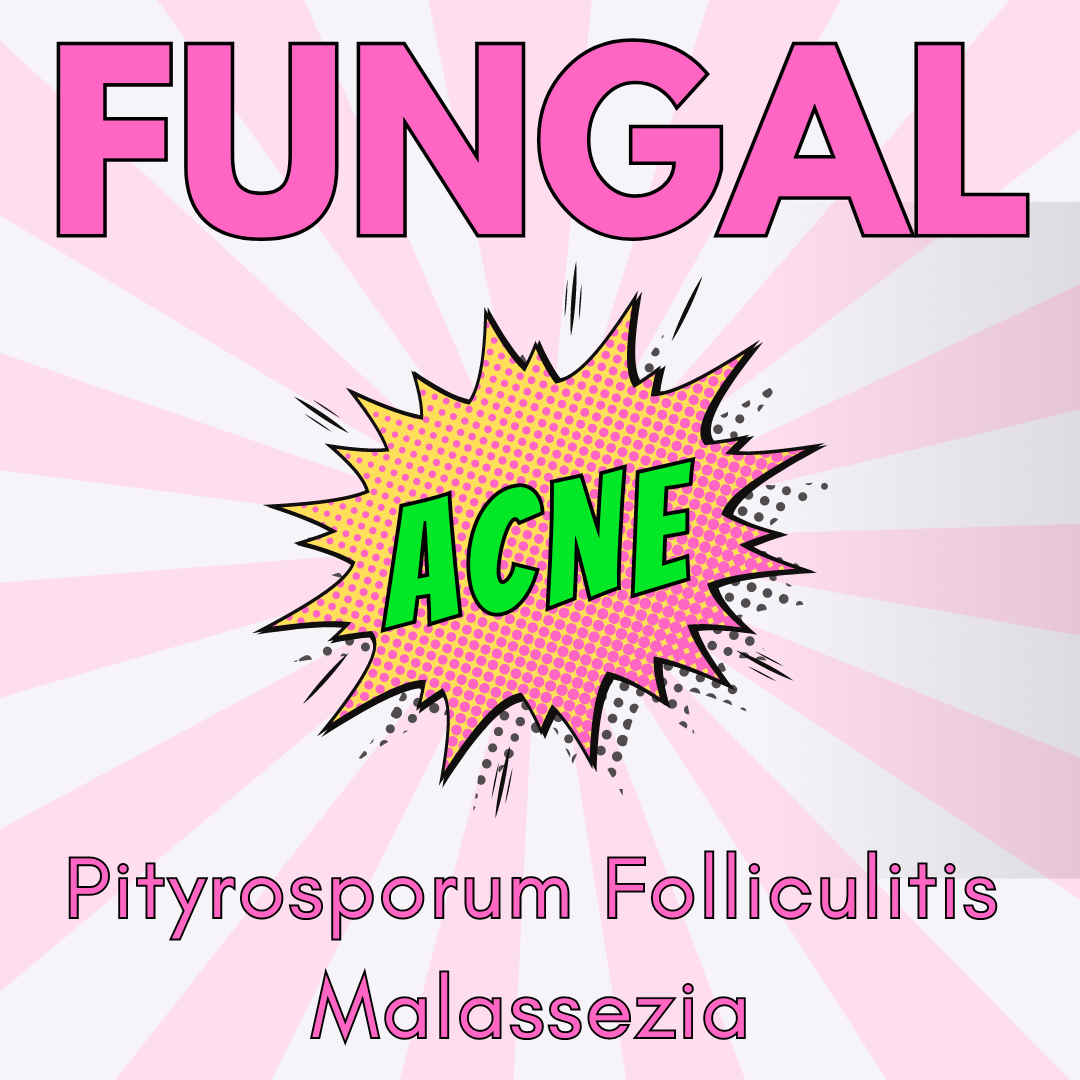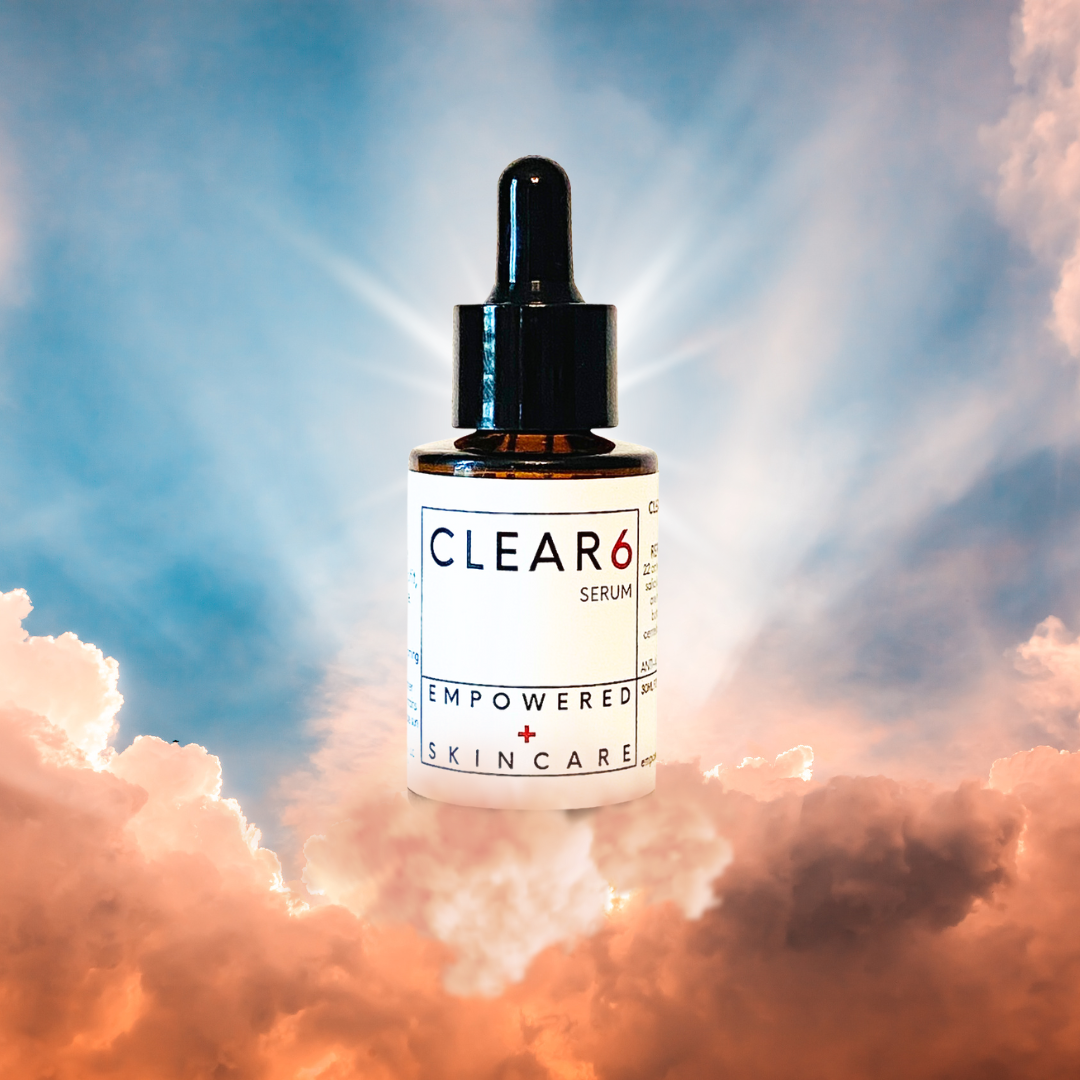
The Shocking Truth About Fungal Acne Revealed. Is An Ingredient in Your Skincare Routine Making it Worse?
Do you have persistent acne that is not responding to treatment? You may be feeling extremely frustrated that all of your efforts are not giving you the results you want. Well... this may be good news:
It is possible you don't have the typical bacterial acne vulgaris or the typical clogged pore caused acne. You may have "Fungal Acne" and it requires a different treatment.
Fungal Acne is not true acne. It is a different condition all together, but looks a heck of a lot like traditional acne so it's easy to get confused. Fungal acne, is actually pityrosporum folliculitis, a common skin condition that results in small raised bumps or blemishes on the skin. Unlike bacterial acne, fungal acne is caused by an overgrowth of yeast on the skin, not bacteria. This overgrowth can lead to small, itchy bumps that resemble acne.
Fungal Acne Causes?
Fungal acne, also known as pityrosporum folliculitis, is a common skin condition that affects many individuals. This type of acne is caused by an overgrowth of yeast on the skin, specifically the Malassezia yeast. While traditional acne is caused by bacteria, fungal acne is triggered by this specific type of yeast. This is also known as: Malassezia Acne or Malassezia Folliculitis.
What is Malassezia?
Malassezia is a type of yeast that is commonly found on the skin's surface. While it is usually harmless, an overgrowth of malassezia can lead to conditions like seborrheic dermatitis or pityriasis versicolor or little bumps, commonly known as fungal acne.
Primary Fungal Acne Areas
Pityrosporum folliculitis/Fungal Acne is located within the hair follicles. The yeast irritates the follicles, leading to a localized immune response that results in redness and swelling. This inflammatory reaction is typical of many acne-like conditions and contributes to the characteristic appearance of small, red bumps associated with pityrosporum folliculitis. It primarily affects areas of the body where hair follicles are most abundant. It commonly occurs on the face, particularly along the forehead, cheeks, and jawline. Additionally, the upper chest, shoulders, and back are frequent sites of pityrosporum folliculitis outbreaks.
Who is most susceptible to fungal acne?
Fungal acne is most common among individuals with oily skin. Athletes are also more prone to fungal acne because their skin stays wet with sweat. Hot climates can exacerbate fungal acne and make it more prevalent. Excessive moisture creates the perfect environment for fungi/Malassezia to thrive. Also, diabetics are more prone to fungal acne and fungal infections because they release more sugar in their sweat than the non diabetic person. More sugar means more food for the fungus to thrive. In summary, damp, warm, oily skin is fungal acne's favorite home.
How can you differentiate fungal acne from traditional bacterial acne?
Distinguishing between fungal acne (pityrosporum folliculitis) and bacterial acne is crucial for effective treatment. Fungal acne typically presents as uniform, itchy, red or skin colored bumps that are smaller in size compared to traditional bacterial acne. It commonly appears in areas with high sebum production, such as the forehead, chest, shoulders, and upper back. Unlike bacterial acne, which often includes larger, pus-filled pimples (pustules) and deeper cysts, fungal acne tends to lack whiteheads or blackheads and may worsen with traditional acne treatments. A dermatologist can provide an accurate diagnosis through microscopic examination or skin culture tests.
Fungal acne treatment and fungal acne skincare
Treating fungal acne typically involves using anti-fungal products to target the overgrowth of yeast on the skin. Ingredients such as ketoconazole, selenium, or pyrithione zinc can be effective in treating fungal acne. Tea Tree Oil and sulfur are natural options, as well. Clear 6 Serum is perfectly designed for fungal acne because it has tea tree oil, and doesn't contain any glycerin. (more about glycerin below)
Tea tree oil, also known as melaleuca oil, is a popular essential oil that has been used for centuries for its various health benefits. When it comes to skincare, tea tree oil is a powerhouse ingredient that can help address a wide range of skin concerns. Let's explore the skin benefits of tea tree oil in more detail.
1. Bacterial and Fungal Acne Treatment
Tea tree oil is well-known for its anti-inflammatory and antimicrobial properties, making it an effective natural remedy for acne. It can help reduce redness, swelling, and inflammation associated with acne breakouts. Additionally, tea tree oil has antibacterial properties that can help kill acne-causing bacteria on the skin.
2. Soothes Irritated Skin
If you have sensitive or irritated skin, tea tree oil can help calm and soothe the skin. Its anti-inflammatory properties can help reduce redness and itching, making it a great ingredient for those with conditions like eczema or psoriasis.
3. Controls Oil Production
Tea tree oil has a balancing effect on the skin's oil production, making it beneficial for those with oily or combination skin. By regulating sebum production, tea tree oil can help prevent clogged pores and breakouts.
4. Fights Fungal Infections
Due to its antifungal properties, tea tree oil is effective in treating fungal infections like athlete's foot and nail fungus. It can help inhibit the growth of fungi on the skin and nails, promoting faster healing.
5. Natural Antiseptic
Tea tree oil is a natural antiseptic that can help prevent infections in minor cuts, scrapes, and burns. Applying tea tree oil to wounds can help cleanse the area and promote faster healing without the risk of irritation.
Overall, tea tree oil is a versatile and effective ingredient for skincare, offering a wide range of benefits for various skin concerns. Whether you're dealing with acne, irritation, or fungal infections, incorporating tea tree oil into your skincare routine can help improve the overall health and appearance of your skin.
Sulfur for Fungal Acne?
Have you heard about the amazing benefits of sulfur for your skin? If not, you're in for a treat! Sulfur is a natural mineral that has been used for centuries to improve skin health and treat various skin conditions.
What is Sulfur and How Does it Work?
Sulfur is a mineral that is found in the earth's crust and is known for its anti-inflammatory and antibacterial properties. When applied to the skin, sulfur helps to unclog pores, reduce inflammation, and kill bacteria that can cause acne and other skin issues.
Benefits of Sulfur for Skin
Research has shown that sulfur can be highly effective in treating acne, eczema, psoriasis, and other skin conditions. It helps to regulate oil production, reduce redness and inflammation, and promote overall skin health.
Studies have also shown that sulfur can help to improve the appearance of scars and promote faster healing of wounds. It can also help to exfoliate the skin, leaving it looking brighter and more radiant.
How to Incorporate Sulfur into Your Skincare Routine
There are many skincare products on the market that contain sulfur, such as sulfur masks, spot treatments, and cleansers. These products can be used regularly to help improve the overall health and appearance of your skin.
It's important to note that sulfur can have a strong smell, so it's best to use these products at night or when you won't be around others. Additionally, it's always a good idea to do a patch test before using any new skincare product to ensure that you don't have a negative reaction.
Sulfur is a powerful mineral that can work wonders for your skin. Whether you're dealing with acne, eczema, or just want to improve the overall health of your skin, incorporating sulfur into your skincare routine can help you achieve the clear, radiant skin you've always wanted.
What to avoid if you have fungal acne?
You should avoid benzoyl peroxide and anti-biotics as these may make fungal overgrowths worse. I recommend avoiding glycerin, as this may feed fungal acne and it's why Clear 6 Serum is Glycerin free!
Glycerin, a common ingredient in skincare products, can potentially exacerbate fungal acne due to its humectant properties. Fungal acne, or pityrosporum folliculitis, thrives in environments where yeast can feed on sugars like glycerin. This ingredient is widely used for its ability to attract moisture to the skin, but for those prone to fungal acne, it can inadvertently contribute to outbreaks.
Research suggests that glycerin-based products might create an environment conducive to fungal growth, leading to persistent or worsening symptoms. It's essential for individuals dealing with fungal acne to opt for glycerin-free skincare alternatives to minimize the risk of aggravating the condition.
When choosing products, look for labels that explicitly state "glycerin-free" or opt for formulations that use alternative humectants. This proactive approach can help maintain a balanced skin environment and reduce the likelihood of fungal acne flare-ups.
Prevent Fungal Acne:
1. Keep Your Skin Clean and Dry
Regularly wash your face with a gentle cleanser to remove dirt, oil, and sweat that can contribute to fungal acne. After washing, make sure to thoroughly dry your skin, especially in areas prone to fungal acne, such as the chest and back.
2. Avoid Heavy Moisturizers and Oils
Fungal acne thrives in a moist environment, so it's important to avoid heavy moisturizers and oils that can clog pores and create a breeding ground for yeast. Opt for lightweight, non-comedogenic products instead. Products contains esters and many types of lipids can exacerbate fungal acne. I use Clear 6 Serum AS my moisturizer because it gives me just enough hydration and moisture underneath my SPF.
3. Wash Your Clothes and Bedding Regularly
Fungal acne can also be triggered by wearing clothes or sleeping on bedding that harbors yeast. Wash your clothes, towels, and bedding regularly in hot water to kill any yeast present and prevent fungal acne flare-ups. Be sure to wash your hats too as you can trap sweat, heat, and oil on your forehead.
4. Consult a Dermatologist
If you're struggling to manage fungal acne on your own, consider consulting a dermatologist. They can provide personalized recommendations and prescribe medications or treatments to help clear up your skin.
By following these expert-recommended steps, you can take proactive measures to prevent fungal acne and maintain healthy, clear skin. Remember to be consistent with your skincare routine and listen to your skin's needs to effectively manage fungal acne.By understanding the causes and symptoms of fungal acne, individuals can take steps to effectively manage and treat this common skin condition. Remember, proper skincare and consultation with a dermatologist are key in addressing fungal acne.
Please know, I'm here to help you on your clear skin journey. My goal with Empowered Skincare is to help you kick acne to the curb, love your skin, boost your confidence, and feel empowered to get out there and be YOUR BEST YOU! Let's get you confident because it leads to empowerment and you deserve that! I have several blog posts discussing self esteem, confidence building, and empowerment. Those are key qualities to being joyful and feeling valuable.
My favorite fungal acne friendly products are:
Nizoral: My two cents- I hate that this product has dye, artificial fragrance, and Sodium Lauryl Sulfates, BUT it does contain Ketoconazole which does an excellent job at killing yeast.
Clear 6 Serum Is glycerin free, contains tea tree oil which is a major anti-fungal, and has zero esters or lipids that feed fungal acne.
Del La Cruz Sulfur Ointment- dries up acne and fights fungal acne.
De La Cruz Sulfur Ointment - Cystic Acne Treatment for Face and Body - Daily 10 Min Spot Treatment Mask - Safe and Effective Game Changing Hormonal Acne Treatment that Clears Up Pimples
Blueberry Bounce Glycerin free cleanser!
Glow Recipe Blueberry Bounce Gentle Face Cleanser - 3-in-1 Foaming Double Cleanser, Makeup Remover Face Wash & Clarifying Mask - Hydrating Hyaluronic Acid, Blueberry Extract & Exfoliating AHA
Humane Clarifying Toner for Face - 2% BHA Liquid Salicylic Acid - Pore Minimizer and Face Exfoliator - Gentle for All Skin Types - Removes Excess Oil, Dead Skin Cells, and Grime
Squalane Moisturizing Oil!- Glycerin Free and Squalane does not feed fungus. Moisturizing is non-negotiable, even for acne-prone skin. This moisturizing oil from Clarity RX is lightweight, non-comedogenic, and quickly absorbs into the skin, delivering intense hydration without clogging pores. Additionally, squalane oil helps plump and smooth fine lines and wrinkles, giving your skin a youthful boost.
Squalane oil has been gaining popularity in the skincare industry for its numerous benefits. Let's explore the science behind this powerful ingredient.
What is Squalane Oil?
Squalane oil is a saturated and stable hydrocarbon that is naturally found in the skin. It is a derivative of squalene, which is produced by the sebaceous glands. Squalane oil is commonly sourced from olives, sugarcane, and rice bran.
Hydration and Moisturization
One of the key benefits of squalane oil is its ability to hydrate and moisturize the skin. It is lightweight and non-greasy, making it suitable for all skin types. Squalane oil helps to lock in moisture, leaving the skin soft and supple.
Antioxidant Properties
Squalane oil is rich in antioxidants, which help to protect the skin from environmental damage. Antioxidants neutralize free radicals that can cause premature aging and skin damage. Using squalane oil in your skincare routine can help maintain a youthful complexion.
Anti-Inflammatory Benefits
Due to its anti-inflammatory properties, squalane oil can help calm and soothe irritated skin. It is gentle enough for sensitive skin and can help reduce redness and inflammation. Incorporating squalane oil into your skincare regimen can promote a more even skin tone.
Improves Skin Barrier Function
Squalane oil helps to strengthen the skin's natural barrier, preventing moisture loss and protecting against external aggressors. By maintaining a healthy skin barrier, squalane oil can improve overall skin health and resilience.
Overall, squalane oil is a versatile skincare ingredient that offers a range of benefits for the skin. Whether you have dry, oily, or sensitive skin, incorporating squalane oil into your routine can help you achieve a healthy and radiant complexion.
NYX Can't Stop Won't Stop Foundation Glycerin free Foundation. I dont love a matte finish, but if you do... here ya go!
NYX PROFESSIONAL MAKEUP Can't Stop Won't Stop Foundation, 24h Full Coverage Matte Finish -
I usually use a tinted SPF as my makeup and it does have glycerin but I can't find one without!
In conclusion, finding the right products for fungal acne-prone skin can be challenging, but these seven products make it easier. Give them a try, and watch as your skin becomes clearer, smoother, and healthier. Remember to patch test new products.




Leave a comment
This site is protected by hCaptcha and the hCaptcha Privacy Policy and Terms of Service apply.